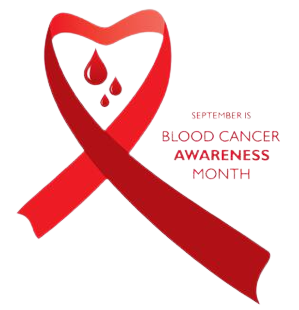RIYADH: Saudi Arabia is using Blood Cancer Awareness Month in September to raise awareness about leukemia, lymphoma, myeloma and Hodgkin’s disease, support patients affected by blood cancer and raise funds for research, a Saudi oncologist has said.
According to a GLOBOCAN 2020 report issued by the World Health Organization, Saudi Arabia had 4,326 new cases of blood cancer, including 1,698 patients who were detected with non-Hodgkin’s lymphoma, 1,676 with Leukaemia, 687 with Hodgkin’s lymphoma and 265 with multiple myeloma.
Speaking to Arab News, Dr. Ayman Al-Hejazi, assistant professor of hematology oncology at King Saudi bin Abdulaziz University for Health Sciences in Riyadh, said: “Raising blood cancer awareness is becoming increasingly important in Saudi Arabia. There are three main types of blood and bone marrow cancers: Leukemia, lymphoma and myeloma.

“In addition to the disease’s malignant nature, blood cancer treatments and management affect patients and caregivers financially and emotionally. People living with any form of blood cancer are impacted in their ability to perform daily activities. A strong emotional impact on people living with the disease includes worry about their future, their treatment and the possibility of relapsing.”
He believes that there is relatively low awareness about blood cancer around the world.
Al-Hejazi, who also spearheads the Saudi Adult Hematology Fellowship Training Program at King Abdulaziz Medical City and serves as the program director, told Arab News: “Awareness is important, and I believe that the government of Saudi Arabia is making tremendous contributions toward raising it through various programs and initiatives.
“However, I equally believe in the importance of collaborative work between governments, healthcare professionals and pharmaceutical companies that offer innovative treatments in creating the most efficient treatment strategies, disease management approaches, and most importantly, post-treatment care plans designed to extend patients’ remission.”
He said that at least nine major national cancer centers provide treatment to patients in Saudi Arabia.
All types of blood cancer affect patients on various levels, and raising awareness to ensure early cancer detection and treatment can save many lives, and improve the quality of life for those undergoing treatments, in remission or their latest stages of recovery as well as those undergoing repeated therapies.
Dr. Ayman Al-Hejazi, Assistant professor of hematology oncology, King Saudi bin Abdulaziz University for Health Sciences
While the Kingdom is considered a high-income country, cancer treatment drug shortages remain a significant challenge around Saudi Arabia as well as in other developed countries.
“One of the solutions to this challenge would be focusing on treatments and disease management strategies that extend remission periods and optimize drug admission. Novel agents in addition to the introduction of more convenient initiatives like the on-body drug delivery systems for cancer therapeutics can reduce overall disease costs,” said the oncologist.
Discussing the different types of blood cancer affecting people in the Kingdom, Al-Hejazi said: “All types of blood cancer affect patients on various levels, and raising awareness to ensure early cancer detection and treatment can save many lives, and improve the quality of life for those undergoing treatments, in remission or their latest stages of recovery as well as those undergoing repeated therapies.
“All types of blood cancer are dangerous and patients in the Kingdom are frequently diagnosed with all of the types. Multiple myeloma is considered to be the second most common hematologic malignancy,” he added.
Multiple myeloma — most frequently diagnosed in people aged between 65-74 — is a cancer of plasma cells, which are types of white blood cells found in bone marrow. However, in the Kingdom, many cases are detected at a younger age, with less than 7 percent of population being older than 65.
Commenting on common symptoms and diagnostic strategies in different stages of blood cancer, the oncologist said that some of the common symptoms of blood cancer include weight loss, bruising or bleeding, lumps or swellings, shortness of breath, drenching night sweats, persistent, recurrent or severe infections and high fevers. Multiple myeloma symptoms can also include bone pain that is persistent or recurrent, fractures, persistent tiredness due to anemia or kidney failure as well as nervous system disorders.
Initial blood cancer diagnoses may include a complete blood count test that measures the amount of each type of blood cell in a sample, as well as a bone marrow biopsy to confirm multiple myeloma, Al-Hejazi said.
First treatments are likely to include a formula of different drugs. Chemotherapy is often thought of as the only treatment option, but a range of cancer drugs are also available in the Kingdom.
A majority of people newly diagnosed with blood cancer receive emotional support and care from family, but many patients still feel isolated even when surrounded by relatives and turn to the internet for help, said Al-Hejazi.
Family members are more likely to give multiple types of care, such as helping the patient in their general housework. Carers can often be highly impacted by their role, affecting them psychologically, socially and financially. Meanwhile, cancer patients can develop mental health conditions and most commonly experience depression and fear.
The most important objective, however, should be to extent progression-free periods, with the ultimate treatment goal for multiple myeloma being to minimize patients’ and caregivers’ economic burdens, said Al-Hejazi.
The term blood cancer is a general description of various hematopoietic cancers. Our blood flows through blood vessels to supply all tissues in the body with nutrients.
In about five liters of blood circulating in our body there are billions of blood cells that carry out various vital functions. All blood cells originate from hematopoietic stem cells.
Hematopoietic stem cells are known as mother cells and are able to renew and replace other cells that die.
Blood cancer is an abnormal proliferation of cells in bone marrow, especially white blood cells. Cancer cells flood the blood and drive out healthy cells.
As a result, the blood can no longer perform its basic tasks, such as transporting oxygen and protecting the body from infection.




























